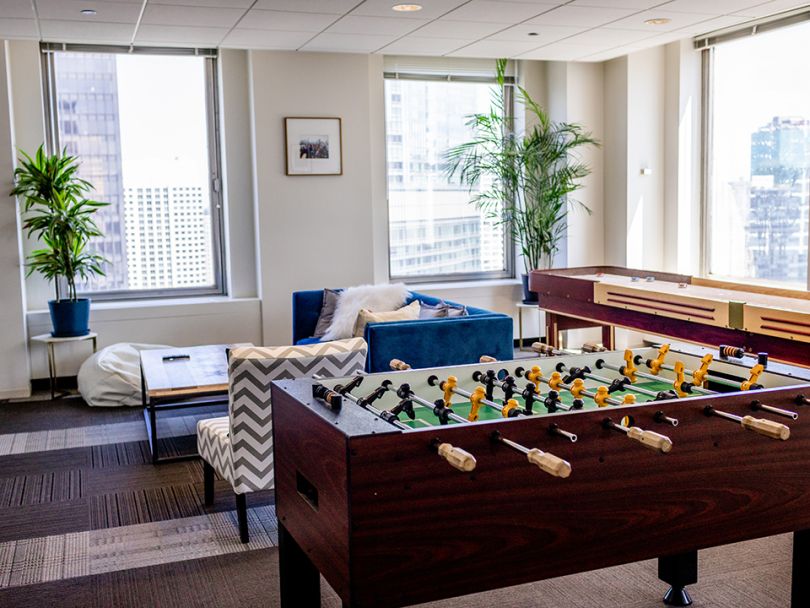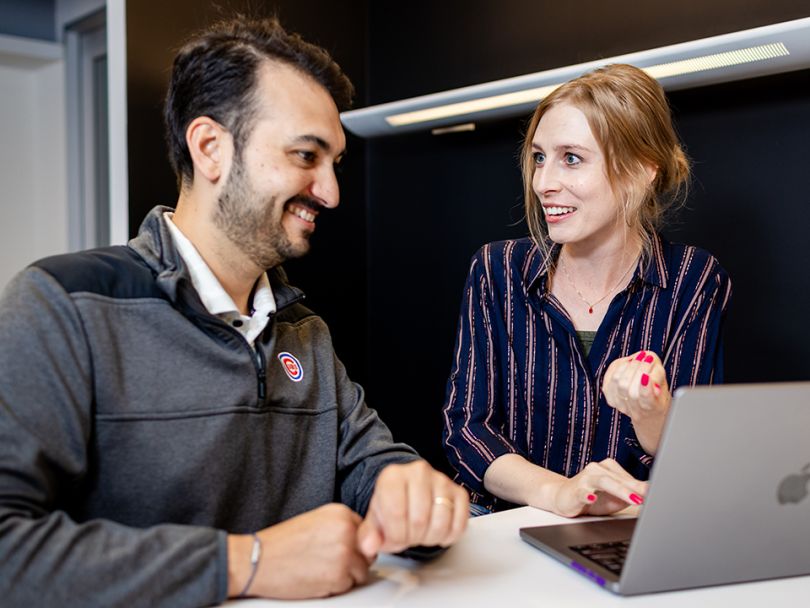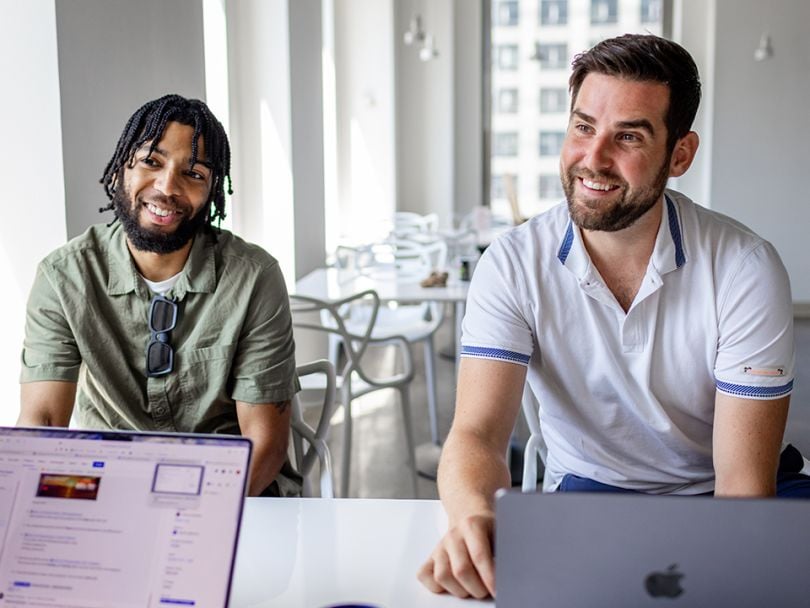There’s never been a busier time at Productive Edge, a digital transformation consultancy and software development firm that specializes in working with healthcare companies.
It was recently selected as the data and technology partner for the Healthcare Workforce Innovation Coalition, a Louisville-based organization founded to help the city meet its skyrocketing demand for healthcare professionals — with 8,500 new job openings forecast by 2029. Productive Edge will lend its cloud and data expertise to the coalition, building digital solutions that help with recruitment, training and career development.
Productive Edge has also launched a suite of generative artificial intelligence solutions, which include tools for automating administrative work and answering common patient questions. Its generative AI consulting services are much needed — just six percent of health systems have a generative AI strategy in place, reported consulting firm Bain & Company.
Whether it’s enabling Louisville-area healthcare companies to hire and train thousands of new employees or helping a hospital across the country develop a strategy for generative AI, there will be no shortage of work for Consultant Carmen Bertucci and his team. However, just because the company has a lot on its plate doesn’t mean Bertucci and his colleagues will be pulling extra hours. That’s not how things work at Productive Edge.
“We get things done, and we do it in a way that doesn’t crush the team,” Bertucci said. “We set proper expectations that keep clients happy without forcing our team to work extra hours just to hit them.”
Ensuring its team doesn’t have to sacrifice work-life balance to work with the latest tech on challenging client projects is a key facet of the culture at Productive Edge.

From Problem to Product
The healthcare industry has long been seen as a laggard when it comes to digital transformation and adopting new technologies. This isn’t entirely accurate, though.
While it may have been unprepared for the rapid rise of generative AI, its overall adoption of artificial intelligence ranked middle of the pack among six industries in a 2022 McKinsey report on tech trends. In a 2021 Deloitte report on digital transformation in healthcare, 60 percent of respondents said they were halfway to their “ideal digital state.”
While healthcare companies are in the midst of their respective technological evolutions, Managing Director Evan Roth noted that there is often a gap between what clients want and what can be built.
“Translating a client’s vision into a real approach is typically a challenge,” Roth said. “Recently, we worked through an especially challenging project that stretched our discovery process — we had to go deep with various teams with competing visions of the end product.”
It’s for this reason that Roth said his team looks for more than just technical skills when recruiting. “We really focus on hiring folks who bring a consulting mindset to problem solving,” he said.
“We really focus on hiring folks who bring a consulting mindset to problem-solving.”
A crucial aspect of the consultant mindset is working with clients to understand their pain points and translate expectations into a product roadmap. A bias for action is key, with teams expected to bring solutions to clients before problems.
Andrés Colon, lead product manager, and his team exemplified this during a recent client engagement where problems with the accuracy and consistency of customer data emerged.
“We took a proactive approach, undertaking a rigorous review of the client’s data sources, pipelines and storage systems to locate potential points of degradation,” Colon said. “By assessing all data entry points and transformation processes, we were able to highlight human error or technical malfunctions.
“A collaborative effort was essential to address this complex problem,” he added.

Collaboration and the ‘Egoless Mindset’
As Colon hinted, collaboration is vital to the work Productive Edge does. Bertucci confirmed, noting that the team prioritizes keeping the “collaborative energy” high and placing emphasis on flexibility and team, rather than individual, achievements.
“Everyone is a master in their own area, but we’re all about helping each other and scoring team wins,” Bertucci said.
Collaboration also plays a role in shaping the employee experience. Team members are given the opportunity to create the workplace they want by participating in anonymous employee satisfaction surveys, with one-on-one meetings with managers to share more personal insights and experiences.
According to Colon, employee feedback has led to the formation of specialized skill groups around product management and technical architecture along with new diversity, equity and inclusion initiatives.
An Evolving Commitment to DEI
In 2021, Productive Edge put its DEI strategy under the microscope and brought in the social impact firm Ethos Equity for an audit. A handful of Ethos’ recommendations have since been implemented, including making Martin Luther King Jr. Day and Juneteenth company holidays and offering employees two days off per year to volunteer. “Having an outside consultancy come in was us acknowledging that we know we can evolve, improve and find ways of communicating more effectively what DEI means to us,” Raheel Retiwalla, chief strategy officer, told Built In Chicago in a September 2022 interview.
To ensure the collaborative energy stays high, Colon said the team works to cultivate an “egoless mindset,” which he called “the essence” of Productive Edge’s culture. Those with an egoless mindset are open to not just collaborating with their colleagues but also learning from them. It’s about being equally strong in a supporting role as in a starring role.
“Our goal is to maintain an environment where everyone supports, uplifts and celebrates each other, ensuring collective growth and fulfillment,” he said.

Pursuing Happiness and Productivity
As Productive Edge prepares to take on some of the largest tech challenges in the healthcare industry, it will need its tech team to be at its peak productivity. Given this, one might think that Colon, Roth and Bertucci will shift their collective gaze toward deliverables and deadlines and away from fostering team culture.
That’s not the case, though. These three leaders plan to double down on their commitment to maintaining a positive work-life balance, collaboration and the egoless mindset. This commitment to culture is practical, not performative.
A focus on work-life balance helps remote employees keep their performance high as leaders proactively address potential challenges they may face, like setting boundaries with work and feelings of isolation. An emphasis on collaboration keeps the team on the same page when client needs pull personnel in different directions. Cultivating an egoless mindset enhances collaboration by ensuring that team members are just as happy to support as they are to shine.
“Our people are the lifeblood of our team, not just resources,” Bertucci said. “We won’t have a productive team if we don’t have a happy team.”







